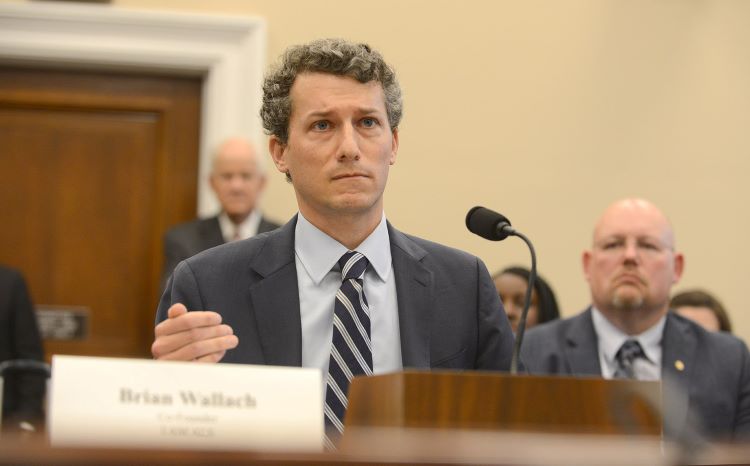After ALS diagnosis, Brian Wallach fights for a cure: 'This is our closing argument for our lives'

ABA member Brian Wallach and his wife, Sandra Abrevaya. Wallach and Abrevaya met in 2008 while working on the Obama for America campaign. Photo courtesy of I Am ALS.
Brian Wallach was preparing for a case in 2017 when he felt a weakness in his left hand. At 36 years old, the assistant U.S. attorney for the Northern District of Illinois ignored it. He had been on the track and field team at Yale, after all, and he was healthy. Why worry?
But it happened again. And again.
His wife, Sandra Abrevaya, noticed he was coughing and made him go to his general practitioner, who quickly sent him to a neurologist at Northwestern Medicine.
“Sit down,” the doctor said. “You have ALS.”
Amyotrophic lateral sclerosis, also known as Lou Gehrig’s disease, is an always-fatal, progressive neurodegenerative disease. Eventually, ALS impacts control of the muscles needed to move, speak, eat and breathe. There are no cures and no treatments to reverse its course.
The doctor told Wallach he had six months to live. “Get your affairs in order.”
Wallach’s reaction: Prognosis be damned. I’m going to live.

Community organizing
Wallach and Abrevaya met in 2008 while working on the Obama for America campaign. Abrevaya, a Northwestern University School of Law graduate, served as the New Hampshire communications director. Wallach, a Georgetown University Law Center graduate, was the deputy political director for the New Hampshire primary campaign. Both went on to work in the Obama White House: she as associate communications director and he as senior vetting counsel.
“Hope” is a word these two Obama campaign alums say a lot.
“I left the campaign a changed person because I saw the power that people can have if they listen to each other and come up with a set of things they want to make happen,” says Wallach, who joined the American Bar Association in 2009.
In the months after the diagnosis, the power couple, now living in Kenilworth, Illinois, summoned their legal backgrounds, their Washington political connections and their unstoppable energy to declare war against ALS—not only to help Wallach but all who live with the disease.
In 2019, they founded I Am ALS, a patient-led community offering the support and resources to those impacted by ALS that they felt was missing as they navigated the no man’s land of neurodegenerative diseases. It serves as a hub for activists in the ALS community who want to effect change with the support from the Chan Zuckerberg Initiative, Tambourine and other philanthropists.
The ultimate goal is to find a cure and “to live—to live,” Abrevaya says.
Sports and arguing
Lawyering came naturally to Wallach. His mom, Anne Sullivan, was an attorney at the Securities and Exchange Commission and his dad, Paul Wallach, was a partner at Hale and Dorr.
“As a kid, I excelled in sports and in arguing,” Wallach says. “What I wanted to do was be a litigator, be in court, make arguments and convince people. I got that and more.”
Now, five years post-diagnosis, the disease has robbed Wallach of his ability to speak above a whisper. His wife dutifully and diligently listens to each word and serves as “his voice” as he gives interviews, takes meetings with senators or testifies before Congress. He still has a lot to say.
“One of the things I learned as a lawyer was to take something complex and make it simple so everyone can understand it,” Wallach says. “What we were able to do was to pull away the normal partisanship that is present in D.C. and get people to see that this is not a political issue—it is an issue about human beings being treated better and being given hope.”
 ABA member Brian Wallach speaks during a congressional hearing in April 2019. Photo courtesy of I Am ALS.
ABA member Brian Wallach speaks during a congressional hearing in April 2019. Photo courtesy of I Am ALS.
Pro bono
After his diagnosis, Wallach left the U.S. attorney’s office and headed to the Chicago office of Skadden, Arps, Slate, Meagher & Flom. He previously had worked at the firm’s New York and D.C. offices.
“Brian has a terrific mind,” says Chuck Smith, a Skadden partner and Wallach’s boss. Along with handling paying clients, Smith and Wallach worked on a major voting rights case in Illinois on behalf of nonnative English speakers.
“The ability to be a lawyer while dealing with ALS was really important to give me a mental balance, because ALS can be all-consuming,” Wallach says. “Having work I was doing as a lawyer kept me optimistic and kept me busy—and kept me out of trouble.”
Wallach brought in I Am ALS as a pro bono client. “In the beginning, I was the only person involved,” Wallach says. “It was amazing to see the response of the firm. Everyone wanted to help, and that, for me, was everything.”
Congressional wins
While leading I Am ALS, Wallach has won political battles some called impossible. These include pushing Congress to increase government spending on ALS from $10 million to $80 million annually between 2019 and 2021, and successfully lobbying Congress to allow people with ALS immediate access to Social Security disability benefits instead of subjecting them to a required five-month waiting period—time many with ALS don’t have.
“Brian transforms hope into action better than anyone I know,” Smith says. “He latched onto that hope with an incredibly positive worldview. He’s used to being on his feet, shaping an argument and persuading people. He’s also used to working the legislative process—which committee chair do you need to get to, where are the logjams in the legal framework?”
On July 29, 2021, Wallach and Abrevaya gave testimony at a congressional hearing with the House Committee on Energy and Commerce’s Subcommittee on Health.
“This is our closing argument for our lives,” Wallach said in his introduction.
The two made a case to allow patients expanded access to two promising therapies—AMX0035 and NurOwn—that slowed ALS in patients in trials.
“These therapies won’t be approved for four years. Let me remind you: When you are diagnosed with ALS, you are told you have two to five years to live. So if this won’t be on the market for four years, every single ALS patient—including us—will be dead before having access to either therapy,” Abrevaya said.
Their testimony worked. After receiving bipartisan support in Congress, in December 2021, President Joe Biden signed the Accelerating Access to Critical Therapy for ALS Act. The law invests $100 million annually for the next five years to issue grants for research on promising therapies, creates a public-private partnership to speed the development of therapies and offers grants to prevent, diagnose, treat and cure ALS and other neurodegenerative diseases.
Biden used the occasion to give a shout-out to Wallach and Abrevaya’s advocacy.
“They never gave up. They launched I Am ALS to put a face on the movement, powered by the people,” Biden said. “To Brian and Sandra, to the patients and caregivers who built and led this movement, thank you, thank you, thank you.”
Of all his I Am ALS accomplishments, Wallach says he is most proud of the ACT for ALS legislation.
“We wrote a bill that created real urgency in the system that had never had urgency before. We created new pathways to accelerate research for all people living with ALS and other neurodegenerative diseases,” he says. “That was the realization of hope into reality—which is what we have to do to leave the world a better place.”
The synergy of the couple’s skills gets things done, says Tina Tchen, chief strategy and impact officer at the Obama Foundation, who worked with both Wallach and Abrevaya at the White House.
“Brian is a really smart lawyer with great judgment, not only on legal questions but on strategy, impact and PR,” she says. “Combine that with Sandra’s communications skills, and only these two people could have done what they did while still facing this horrific, challenging experience simultaneously. It’s impossible to do just one of those things well, but to do all of them? That’s impossible.”
Wallach is not stopping there. Next, he and Abrevaya will build “a cures for all” campaign that raises the level of awareness, advocacy, funding and research for all neurodegenerative diseases, including Alzheimer’s, Parkinson’s and frontotemporal dementia.
“We have hope. We have challenges,” he says. “But when we all get together, we can change the world.”
Members Who Inspire is an ABA Journal series profiling exceptional ABA members. If you know members who do unique and important work, you can nominate them for this series by emailing [email protected].



